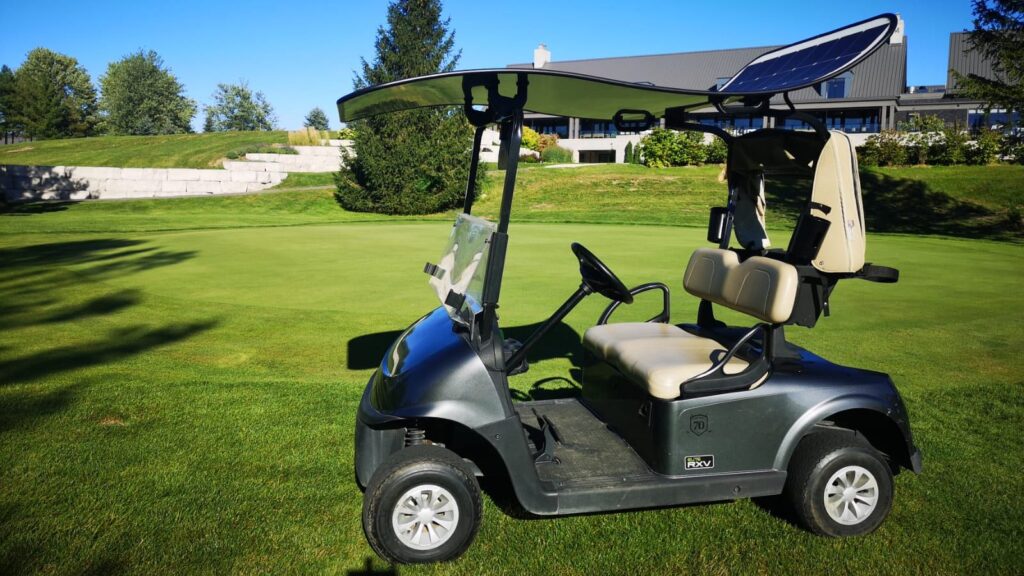Original Article by Rick Young, ScoreGolf, November 17, 2022
Maybe it’s premature for me to dust off music journalist Jon Landau’s famous, “I saw rock and roll’s future and its name is Bruce Springsteen” quote from 1974, but I’m not sure of a better way to articulate my opinion of Westhill Innovation’s new SunRunner.
The rooftop solar collection panel system designed for low-speed, electric golf carts seems destined for a place in the power cart category. That became obvious to me after I attended a briefing Tuesday at Monthill Golf and Country Club in Caledonia, Ont. Although it’s not a new concept — solar panels have been seen on golf carts for quite some time — no one has been able to commercialize a solar-based option for the industry. Until now.
With that, a little about Westhill Innovation.
The Simcoe, Ont., outfit is a Clean Tech company specializing in the design and supply of mobile, solar-powered integration systems for the commercial and recreational transportation industries. Led by Gina Succi, its chief executive officer, Westhill Innovation employs just 17 people, including eight in manufacturing.
In the past four years, Westhill developed SunRunner, an ultra-lightweight, self-contained, scalloped-shaped solar composite roof module and power kit that creates a no-plug-in solution for standard golf power carts, multi-people movers and golf course maintenance vehicles.
Being in a constant state of perpetual re-charging (even on overcast days), the system can produce 405 watts of power (600- and 1,000-watt versions are also available) supplied directly to the golf cart. That is enough to extend the drivable range of a three-horsepower electric golf cart by up to 24 kilometres per day in a city with the sunlight hours of Toronto.
Easily fitted to all makes and models of power carts, the solar roof module is good for more than 20 years and can maintain an efficiency rate of 80 per cent during that time.
Trials done at Monthill and the Briars Golf Club in Georgina, Ont., this season indicate carts equipped with SunRunner solar technology were returning after 18 holes over 90 per cent charged and still over 80 per cent charged after three rounds.
“As the golf industry continues to focus on sustainability it’s ideas and solutions like the SunRunner we are looking for,” said Stu Bradshaw, golf course superintendent at Monthill. “Having the ability to charge a golf cart from the sun while it’s being used — that’s the definition of sustainable. Monthill and I have been very impressed with the initial testing of the SunRunners.”
Golf course operators can benefit from the technology on multiple fronts.
Environmentally, there is increased potential for CO2 emissions reductions down to zero, which in certain North American locations qualifies for government incentives up to 30 per cent.
All of the SunRunner circuitry is embedded without wires, while lead acid with solar power is capable of performing as well or better than lithium batteries at a lesser cost.
Savings-wise, courses will see dramatically reduced electricity bills. In fact, several SunRunners plugged together can supply a clubhouse with a power source in the event of power failure or disruption, and the bidirectional charging aspects of the collection system allow a course to feed and make money from supplying the grid.
“It’s not about the technology anymore,” said Succi. “We know it works. Now it’s more about how do you work with people who have thought a certain way for a really long time? How do you change minds and longtime conventional thinking? Not only is this a paradigm shift for power carts, it will dramatically change the way the golf industry operates. This can be pretty big. It’s the future of transportation. I don’t think people have given solar a lot of credit.”
Succi speaks to that with some authority. Westhill Innovation has perfected a similar technology for the commercial trucking industry called SunShifter.
The one-of-a-kind, solar-powered, electro-mobility solution uses the sun to power refrigeration systems while saving fuel and reducing carbon footprint emissions. It too can power the grid.
“We’re a technology company. I need to be able to stand behind our technology and back up the results regardless of whether it’s a golf cart, a short box truck or a refrigerator transport trailer,” explained Succi, who acknowledged the help of local logistics partner, Transrep Inc., and its president, Kim Richardson. “We’re at the front end of where this is going. Our company is ready to take orders, it’s ready to seed the market and get the word out.”
Westhill is also ready to ramp up manufacturing. Plans for a full-scale production line are in place, including a capital investment for automation to scale up as necessary.
“We can get them made pretty quick,” Succi said.






